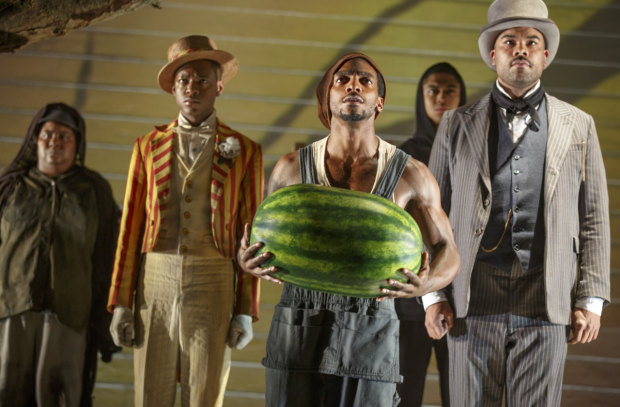The Death of the Last Black Man in the Whole Entire World
Signature Theatre revives Suzan-Lori Parks’ racial drama.

(© Joan Marcus)
Pulitzer Prize winner Suzan-Lori Parks' 1990 drama The Death of the Last Black Man in the Whole Entire World, a.k.a. The Negro Book of the Dead, now running at the Pershing Square Signature Center, is not the mindless escapism audiences are likely to be craving right now. But one could glean that much from the title, which does anything but bury the lede in setting the tone for the play's proceeding 75 minutes.
Instead of letting you off the hook, it holds your feet right to the fire, forcing a reflection on the recorded history (or lack thereof) of African-American heritage with a nonlinear story that is difficult to parse. However, if you're up for a mental and emotional challenge, Parks' poetic one-act is worth meditating on at this unsettled social and political juncture that is already making its way into American history books.
With movements like Black Lives Matter confronting an increasing public denial of systemic racism, the need for history to record the truth is more pressing than ever — though I suppose it was just as pressing nearly a quarter of a century ago when Parks first penned the metaphorical piece. The symbolic figures that make up director Lileana Blain-Cruz's talented ensemble are a collection of racial stereotypes with names like "Yes and Greens Black-Eyed Peas Cornbread" (Nike Kadri), "Lots of Grease and Lots of Pork" (Jamar Williams), and "Ham" (Patrena Murray playing a role that recalls Noah's son, who is often associated with the Biblical justification for black slavery), among others.
Roaming through what feels like a timeless ether, they surround Parks' central character, "Black Man With Watermelon" (a compelling Daniel J. Watts), who wakes from death at the beginning of the play, only to die over and over again in a variety of gruesome ways. Being "the last black man in the whole entire world," his perpetually impending death presents an urgency to document his history while he has the chance — Kadri's character echoing refrains of "You should write this down. You should hide this under a rock."
Like a spoken-word symphony, the play's monologues and call-and-response passages are delicately woven together with attention focusing interruptions by the double-chime of a bell (sound design by Palmer Hefferan). The flowing rhythms and dystopic aesthetic, aided by Riccardo Hernandez's sparse set centered around a dying tree and projection designer Hannah Wasileski's haunting shadows, are a brilliant manifestation of the black hole from which Parks is attempting to resurrect African-American history.
Yet, as descriptive as the design is, Parks' text is doubly abstract and is likely to lose you along the way. Aside from the repetitive phrases that are seared onto our brains (one being the play's long-winded title), we're left to wander aimlessly around the play without a map or key.
Even within this obscure narrative, Roslyn Ruff's stunning performance as "Black Woman With Fried Drumstick" (wife of "Black Man With Watermelon") registers loud and clear. She joins Watts center stage for the majority of the performance, watching him repeatedly die and return, trying to feed him a fried drumstick to keep him alive. The tender relationship between Watts and Ruff's characters is the only accessible element of the play and succeeds in bringing out the human emotion that the other noncharacters lack. As she and her husband exchange final pleas of "Remember me…Miss me," you can't help but hope someone did.








